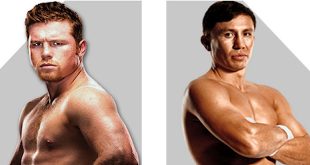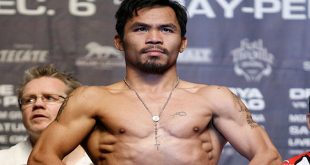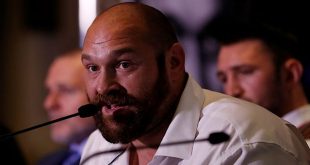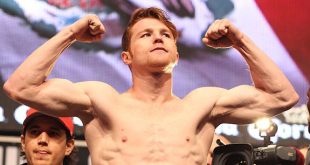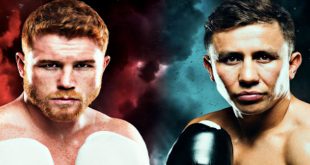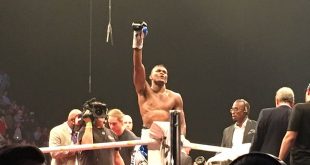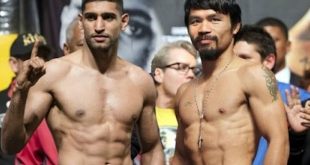Junior ‘The Hitter’ Witter, 37-4-2 with 22 KO’s, started his career back in 1997, in which he achieved the Commonwealth, British and European Light Welterweight titles before capturing the WBC belt, which he defended twice before losing it to Timothy Bradley.
Questions have arisen since his last few outings as to whether or not Witter can still perform at the level he used to. In his last fight, he lost to Victor Puiu 18-1-2.
Puiu is a decent enough fighter but nothing special, in reality the Witter of a few years back would have demolished him; in effect, the writing was on the wall. Before that, Witter lost to Devon Alexander, who was 18-0-0.
Alexander is a young, hungry, gifted fighter who belongs in the upper echelons of the division. Witter clearly did not have the legs, or the reflexes that allowed him to fight like he used to and he retired at the end of the eighth round, culminating in the only stoppage loss in his career.
Witter had a very hard career, and it was not the case of him not wanting the big fights, if anything, he would not shut up about fighting the top of the division whenever he had the airtime.
In a way, he made a rod for his own back in being such an awkward fighter…no one wanted to get involved. He was maximum risk, minimum gain.
Often he would openly call for bouts with Floyd Mayweather or Zab Judah, a wish he had granted by the latter, much to his detriment. Another thorn in his side, as he saw it, was a certain Mr. Hatton.
Unfortunately for Witter, whilst he was moving up through the paid ranks, there was another fighter, at light welterweight, who was making his own waves in the sport, Ricky Hatton.
Witter was always in Hatton’s shadow as Hatton had the bigger following. Hatton had a bigger fan base and a far more fan friendly fighting style i.e. an aggressive, pressuring, vulnerable heart on the sleeve kind of fighter as opposed to Witter’s switch hitting, awkward, punching from angles kind of style.
Of Witter’s first ten fights, there were two draws, 2 Knockouts, and 6-point decision wins. Hatton’s were five Knockouts, 5 points decision wins.
It is a shame Witter didn’t have the fan following as he was a gifted fighter, and did carry power. A counter puncher at heart who relied heavily on his reflexes and went on and fought IBF Champion Zab Judah in Witter’s 17th pro fight.
This was quite a remarkable feat, Witter was not experienced enough at that time to compete with a prime Judah and lost on points, yet he did not discredit himself and went the distance with the Brooklyn fighter. He used his movement well and frustrated Judah several times.
Had Hatton fought Judah, looking for a world title in his 17th fight, ‘The Hitman’ would have been knocked out.
Several fights later, back on home territory Witter won the British title, beating Alan Bosworth for the vacant crown, winning by KO in the third.
In his next fight, he picked up the Commonwealth title knocking out Laatekwei Hammond in the second round. A couple of fights later, he faced Giuseppe Lauri, a good fighter, a gatekeeper of sorts; Witter knocked him out in two rounds.
Next was the European title to cross off the list, vacant at the time. Witter faced Salvatore Battaglia, who was 21-3-0. Witter, again, knocked him out in the second.
Witter went on to defend the Commonwealth, European and British titles four times against solid opponents: Krzysztof Bienias, Lovemore N’Dou, Andriy Kotelnik and Colin Lynes.
Apart from Bienias, who Witter stopped, the rest he went the distance with, winning a UD against each. You could argue that the class of opposition stepped up, or that Witter did not want to get involved in tear ups anymore and was content to sit on the back foot and outbox them over the distance. Either way, he was still winning.
September 2006 and Witter would again get a shot at a world title, this time the vacant WBC belt. His rival was Demarcus Corley, who on his day can be a handful for any fighter, who has fought a plethora of talent in and around the 140 lb division. Before meeting Witter, he had already faced Randall Bailey, Zab Judah, Floyd Mayweather and Miguel Cotto.
Witter beat Corley over the distance, winning nearly every round and earning himself a unanimous decision.
Witter was world champion, and well deserved really.
At the same time on our screens we had domestic rival and old enemy Ricky Hatton, who had also made himself a world champion the year before in a career best performance dethroning the mighty Kostya Tszyu in an all out war.
Not only that, Hatton was undefeated, making huge waves in America and was capturing the British public’s pound, much to Witter’s annoyance.
However, we all know how the Hatton story worked out. Witter defended his title with a easy mandatory defence and then had what was probably his last decent performance in him against Vivian Harris.
Harris was probably airing on the ‘just past his best side’ but was still a dangerous puncher and a decent operator. He also possessed a come forward, aggressive style which was perfect for Witter. Witter was content to let Harris stalk him, and would throw well-timed counters, from unorthodox angles, right back at him. Witter stopped Harris in the seventh.
Timothy Bradley was next on the agenda. Bradley was then, and still is a very good, hungry, aggressive, athletic fighter. On paper it looked like too much of a handful for Witter. Witter had shown signs of dominance in his fights but not for a while, and if you are going to be an effective counter puncher at the top level then you will need the legs, the reflexes and the engine to endure it.
Although Witter started dictating the pace, and keeping Bradley at bay with the jab, he couldn’t tag him hard enough to make Bradley think twice about coming inside. Soon enough Bradley’s aggression and youth slowly, but visibly, began to wear Witter down.
In the sixth round, Bradley sent Witter crashing to the canvas with a well-timed overhand right. Witter had not been there before. Bradley took the decision, and rightfully so.
A comeback, warm up fight against Victor Hugo Castro proved that Witter still had some spark left in him, stopping Castro in the third. However, Castro is not exactly the same class as the top-level operators in the division. He wasn’t even operating at domestic level really.
Witter could go on at a domestic or maybe a European level. Clearly he isn’t the fighter he was but then this is the harsh reality of boxing, sooner or later you will not be the young up and comer, you will be the stepping stone or gate keeper for someone else’s career.
Witter may feel he did not achieve all that he could of but in reality, he has had a great career, and will be personally remembered for some great fights, masterful boxing at times, ups and downs, fights that didn’t happen but will always spur debate, and above all a former World Champion which is the dream that every young boxer aims for when they start in the game.
Sit back and tick it off the list Witter.
 Boxing News Boxing News
Boxing News Boxing News
